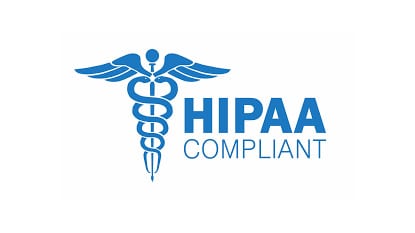Healthcare providers might forget that HIPAA compliance is a requirement for their phone systems. People use their phones numerous times daily, making it crucial to preserve all electronic Protected Health Information (ePHI).
Voice Over Internet Protocol (VoIP) is an electronic information phone system that regularly synchronizes with email and text-based services. When used in the healthcare industry, VoIP must be HIPAA-compliant for healthcare organizations and other sensitive entities to protect patient and healthcare providers’ data.
This comprehensive guide will address your concerns regarding VoIP providers, HIPAA compliance, and which well-known businesses offer HIPAA-compliant VoIP.
Why Should VoIP be HIPAA Compliant?
VoIP service providers must adhere to HIPAA regulations since they may record and keep ePHI. Call recording or SMS features are not sufficiently encrypted. They may break HIPAA rules.
VoIP service providers are regarded as business associates if they store ePHI. To guarantee that they will adhere to the HIPAA Privacy Rule and safeguard ePHI, all business associates must sign a business associate agreement (BAA) with companies that sell VoIP services.
Not all VoIP service providers are eager to sign a BAA or adopt the necessary measures to guarantee PHI safety. It’s crucial to conduct your study and set up your phone systems with providers that comply with HIPAA regulations.
Otherwise, HIPAA infractions could result in fines or remedial action for your healthcare organization.
To maintain HIPAA compliance, your VoIP network operators must abide by particular Security and Privacy Rules.
First, the Privacy Rule, or Guidelines for the Protection of Individually Identifiable Health Information, establishes the federal benchmark for health data security. This rule also guarantees that healthcare professionals should have access to health information when needed to give patients the best care possible. Put another way, and the Privacy Rule achieves a compromise between allowing the use of information and safeguarding the privacy of those seeking care.
Similar to the Privacy Rule, the Security Standard for the Security of Electronic Protected Health Information (also known as the Security Rule) establishes the national standard for safeguarding specific health information stored or transferred electronically.
By addressing technical and non-technical procedures that organizations (also known as Covered Entities) must implement to safeguard individuals’ ePHI, this rule formalizes the safeguards specified in the Privacy Rule. Therefore, a cell service that complies with HIPAA must consider ePHI sources like:
- Caller ID details. The call log connects a person to medical practice and the services they offer without being recorded.
- Conversations are transient and not considered PHI, but recordings might.
- Anywhere there is content, the possibility of specific personal information in audible form exists.
- Transcription of voicemail. It’s practical and provides an additional data source to convert voicemails into text that can be accessed via email or text.
- Convenient, helpful, and yet another route that makes it possible to check for personal information carefully.
- Email to fax, on the other hand, produces stored data records, whereas traditional faxing does not.
- Integrated communication. Electronic data in the form of saved conversation or even video conferencing history can be found on a communications platform that offers more than just voice.
Can we Make our VoIP Phones Compliant with HIPAA?
Yes! Because calls may involve sensitive data that is electronically stored as ePHI, healthcare providers & their vendors require VoIP that complies with HIPAA regulations. Numerous VoIP systems can perfectly adhere to HIPAA standards if they fulfill the following conditions.
Business Associate Agreement
This contract requires HIPAA compliance from all business parties, as discussed in the section above.
Authentication
Each phone has the ability to display a different user ID which helps with authentication when accessing sensitive information. Virtual private networks (VPNs), Transport Layer Security (TLS), and other encryption techniques protect data.
There are many VoIP service providers, but very few are HIPAA-compliant. Unfortunately, a glance at their homepage often does not reveal which ones are and which are not. We conducted the research for you to simplify things and save you a little time.
As mentioned before, there are many HIPAA-compliant VoIP providers, but the two that stood out to us due to their amazing features were:
- Vonage
- RingCentral
Vonage
Due to its impressive cost reductions and excellent call quality, Vonage Business is one of the top VoIP providers for hospitals and medical facilities. Utilizing Vonage Business allows users to cut their call expenditures by 36% on average.
Even with its lowest quality level, Vonage offers unlimited calls and integrates with CRM. The cost of the three packages offered by the business is $14.99, $24.99, and $34.99.
Vonage says its VoIP services are a great choice for healthcare practitioners. The business asserts that medical practitioners can conduct virtual consultations and office visits using its communications software. Does this imply that Vonage complies with HIPAA?
Yes, Vonage adheres to HIPAA regulations. Upon request, the company is prepared to sign a BAA. Its strong security features include dedicated servers with data encryption, firewall protection, and processes to remove security risks.
In addition to being a HIPAA-compliant VoIP provider, Vonage focuses on Text messaging and Webcam messaging for e-visits and clinical consultations. For Vonage to continue to be compliant, the hosting environment must also be HIPAA compliant. It includes compliance for video appointments, group discussion times, reminders for medication and care, status updates, and critical alarms. The hosts, users, and Vonage compliance are made possible via well-known healthcare applications like the Vonage Video API and SMS API.
Some of the best features of Vonage are:
- A strong mobile app integrated with the Vonage Company account enables medical professionals to make and receive calls on their smartphones while conducting business.
- Better patient information synchronization is made possible by many integrations with 3rd party apps. With a cloud-based system, clinicians may access all patient data from any device and be properly informed when responding to patients’ inquiries from any location.
- An automatic attendant directs calls to the appropriate person or a specific department referred to by Vonage Business as a “virtual assistant.”
- Medical administrators have access to group paging, which allows them to reach many staff members simultaneously.
- For improved communication and knowledge sharing, use call bridging, audio conference calls, and video conferencing on Vonage.
- Support for voicemail, including voice messages to email, is available.
RingCentral
Another top VoIP provider, RingCentral, offers a wide range of essential capabilities for medical facilities like hospitals. Thanks to its vast features, advanced PBX solution, and simple scalability, it already supports over 350,000 organizations.
A cloud-based phone network, including video conferencing, group chat, and phone conversations, is available from RingCentral. Additionally, the provider claims to have strong security, including enterprise-level encryption. So, does RingCentral comply with HIPAA?
According to RingCentral, it is ready to sign a BAA. You should be aware that RingCentral will only accept the BAA it supplies and will not recognize a customer’s BAA. Despite the fact that RingCentral has not yet signed HIPAA, its BAA renders the business HIPAA compliant.
On top of this, a HIPAA setting in RingCentral is intended to destroy data per HIPAA compliance initiatives. Additionally, the business offers the best user interface and collaboration tools.
Overall, RingCentral is a HIPAA-ready VoIP service with a tonne of features, but the customer must make sure the auxiliary infrastructure is covered before signing up. To maintain compliance, RingCentral would sign a Business Associate Agreement (BAA), enabling the platform to be set up so that it could remove data automatically. Automatic deletion will extend to RingCentral professional account data, voicemail, voice recordings, RingCentral MVP data, RingCentral fax data, and more.
A few of the main features of RingCentral for hospitals and clinics include:
- A useful mobile app that enables medical professionals to receive & make phone calls on their cell phones so they can reply to patients even if they are not at their offices.
- Unlimited audio and video conferencing to promote improved communication between medical professionals.
- There are numerous interfaces with 3rd-party applications, such as Office365, NetSuite, and Outlook, so doctors and nurses can always access the patient’s identity and pertinent information when they take calls from or about them.
- Easily adaptable for expanding medical facilities and doctor’s offices.
- Excellent customer service reduces downtime by rapidly resolving consumer complaints.
- Call routing and call trees ensure that the most suitable person for each patient’s circumstance answers every call.
- RingCentral has hunt groups or group calls to inform multiple doctors about an emergency or deliver urgent messages simultaneously.
- Simple system setup and administration allow even little medical facilities without an IT department to use the system.
What is the Business Associate Agreement That’s Needed for HIPAA Compliance?
According to HIPAA requirements, a business telephone/VoIP service provider must first be prepared and willing to sign a Business Associate Agreement (BAA) containing ten sections. By doing this, vendors may reassure clients that they comply with HIPAA regulations and take responsibility for the platform’s HIPAA compliance.
Whether it’s a Covered Entity (such as a hospital or clinic) or another Business Associate, a Business Associate Agreement (BAA) is a written agreement between both the provider (a Business Associate like Vonage or RingCentral) and the other party (like an insurer, IT contractor, or billing consultant)




